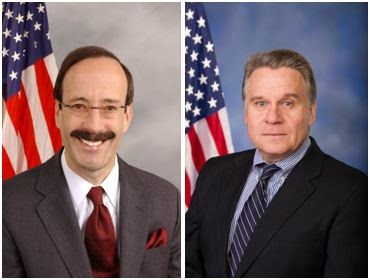“The fight to preserve our common cultural heritage, as well as to deny extremists such as ISIL [Islamic State in Iraq and Syria] resources from the sale of blood antiquities, is yet another front on the global war against terror.” proclaimed Congressman Chris Smith (R-N.J.-4) in a press statement issued last week.
 |
Congressmen Eliot Engel and Chris Smith, sponsors of the
Protect and Preserve International Cultural Property Act. |
Rep. Smith, together with Rep. Eliot Engel (D-N.Y.-16), introduced the Protect and Preserve International Cultural Property Act (H.R. 5703) in the U.S. House of Representatives on Thursday. The bill would create a cultural property protection czar and set up import restrictions to prevent looted and smuggled Syrian heritage material from crossing America’s borders.
Rep. Engel, the lead sponsor of the bill, emphasized its importance: “Since World War II, the United States has been a leader in protecting cultural property. Today, ISIL and other terrorist organizations have found a lucrative source of revenue in artifacts they traffic out of areas of conflict. America must respond by denying terrorists and criminals the ability to profit from instability by looting the world of its greatest treasures.”
The proposed legislation would advance four articulated U.S. policy goals designed to
(1) protect and preserve international cultural property at risk of destruction due to political instability, armed conflict, or natural or other disasters;
(2) protect international cultural property pursuant to its obligations under the 1954 Hague Convention for the Protection of Cultural Property in the Event of Armed Conflict and customary international law in all conflicts to which the United States is a party;
(3) prevent, in accordance with existing laws, importation of cultural property pillaged, looted, or stolen during political instability, armed conflict, or natural or other disasters; and
(4) ensure that existing laws and regulations, including import restrictions imposed through the Office of Foreign Asset Control (OFAC) of the Department of the Treasury, are fully implemented to prevent the trafficking in stolen or looted cultural property.
To promote these objectives, the lawmakers want the White House to appoint a Coordinator for International Cultural Property Protection who will
(1) coordinate and promote efforts to address international cultural property protection activities that involve multiple Federal agencies, including diplomatic activities, military activities, law enforcement activities, import restrictions, and the work of the Cultural Antiquities Task Force established pursuant to the Consolidated Appropriations Act, 2004 (Public Law 108-199);
(2) submit to the appropriate congressional committees an annual report on interagency efforts to protect international cultural property based on information required under section 5 of this Act;
(3) provide policy recommendations, if necessary;
(4) resolve interagency differences in a timely, efficient, and effective manner; and
(5) work and consult with domestic and international actors such as foreign governments, nongovernmental organizations, museums, educational institutions, research institutions, and the U.S. Committee of the Blue Shield on efforts to promote and protect international cultural property.
Under the terms of the legislative proposal, the Secretary of State, Attorney General, Secretary of Defense, and United States Agency for International Development Administrator would be required to submit reports to the cultural property protection czar that describe each department’s efforts to protect cultural property from the threats of armed conflict, political unrest, crime, construction activities, and natural disaster.
The bill curiously omits any duties that might have been placed on the Secretaries of Treasury, Interior, or Homeland Security to supply reports directly to the Coordinator. These cabinet officials supervise agencies that have an impact on international cultural property policy—
agencies like the the Office of Terrorism and Financial Assistance, the Financial Crimes Enforcement Network, the Internal Revenue Service, U.S. Fish and Wildlife, and
Immigration and Customs Enforcement’s Homeland Security Investigations and Customs and Border Protection divisions
. At best, the proposed legislation would have the Attorney General simply offer a report “in consultation with the Secretary of Homeland Security.”
Reps. Engel and Smith also want to implement safeguards to protect endangered Syrian cultural property. Their bill would mandate the President to immediately enact emergency import restrictions under the terms of the Convention on the Cultural Property Implementation Act (CPIA) 19 U.S.C. 2603 in order to stop looted and smuggled antiquities from entering the American marketplace.
The legislation attempts to offer a solution to the CPIA’s cumbersome statutory framework, which currently requires Syria’s government—under whatever form that might be at present—to first ask the State Department for American import controls restricting cultural objects. Recall that the White House recognized the rebels as the legitimate governing authority of the Syrian Arab Republic in 2012.
It remains to be seen whether the 113th Congress will take up these critical requests for a cultural property policy coordinator or for import controls to protect threatened heritage. Congress is in a lame duck session following the GOP’s sweeping election victory earlier this month. Yet the proposed legislation already has been referred to the House Committees on Foreign Affairs, Ways and Means, Armed Services, and Judiciary. The bill’s sponsors, more importantly, are well-known fixtures in the House. They hail from from safe districts where constituents regularly vote them back in office by wide margins.
Rep. Engel is the ranking minority member of the Committee on Foreign Affairs. He is a liberal Democrat who recently earned a fourteenth term after facing no opponent in a district that encompasses New York’s Westchester County and the Bronx. Rep. Engel is known for his sponsorship of the Syria Accountability and Lebanese Sovereignty Restoration Act.
Rep. Smith, meanwhile, first arrived on Capitol Hill following the election of 1980. He is a popular conservative Republican representing Trenton and central New Jersey. He possesses expertise on the topics of foreign affairs and organized crime, serving as senior member of the House Committee on Foreign Affairs; chair of the Commission on Security and Cooperation in Europe; chair of the Subcommittee on Subcommittee on Africa, Global Health, Global Human Rights, and International Organizations; and chairman of the Congressional Human Trafficking Caucus. Last year Rep. Smith introduced a resolution to establish a Syrian war crimes tribunal.
The full text of H.R. 5703, the Protect and Preserve International Cultural Property Act, can be found here.
Photo credit: House.gov
By Rick St. Hilaire Text copyrighted 2014 by Cultural Heritage Lawyer. Blog url: culturalheritagelawyer.blogspot.com. Any unauthorized reproduction or retransmission of this post without the express written consent of CHL is prohibited.
©2010-2022 Cultural Heritage Lawyer Rick St. Hilaire. Content discussing cultural heritage law, art law, looted antiquities, stolen artifacts, and museum risk management that is general information only, not legal advice.



